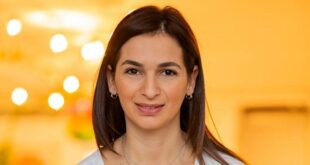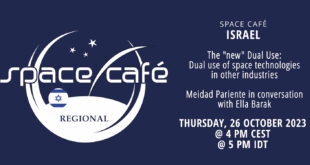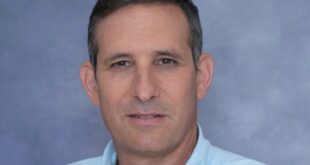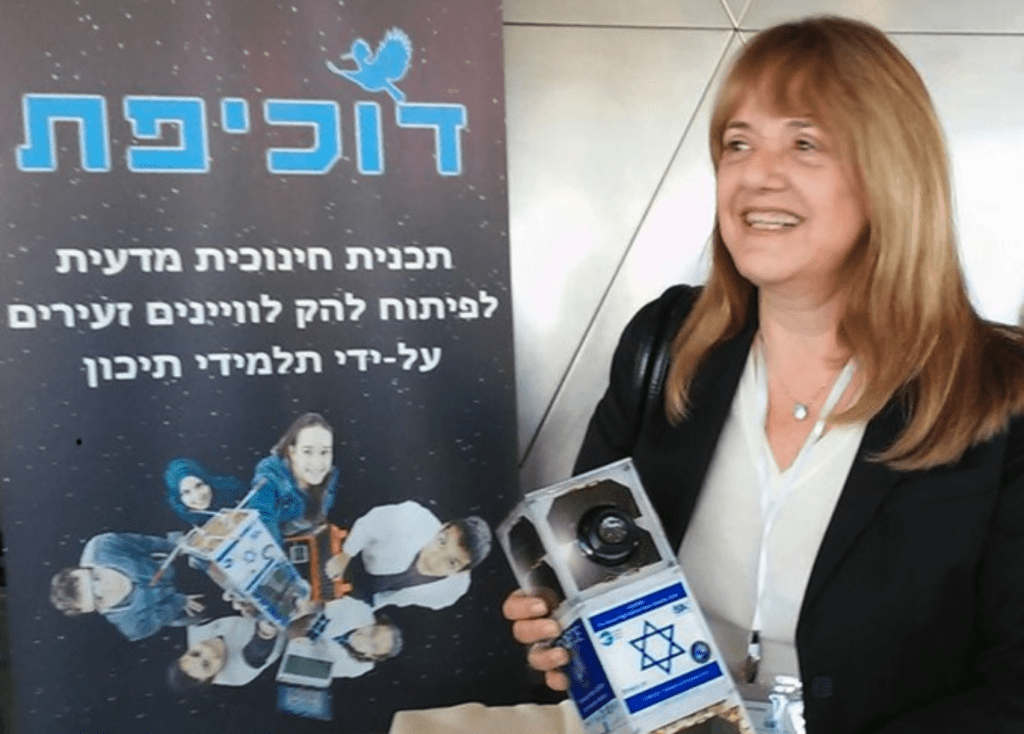
In the second episode of Space Café Israel, Meidad Pariente is in conversation with Dr. Ana Heller, a fierce promoter of science and space technologies for the youth by leading space projects in Europa and South America and simultaneously implementing outreach strategies of international collaboration. During our Space Café, we talked about Anni’s passion for the stars, horse riding, STEM education, and WiSpace.
Can you share with us, something personal that isn’t written in your LinkedIn profile?
I can tell you that I am the result of many cultures. I have grandparents from Ukraine, Italy, Spain, and my parents are from Argentina. If you put all these components together, and add the other one, the most explosive, the Israeli ingredient, so what you get is a very passionate woman. But I will tell you something funny. This is a story that my grandmother told me is about the passion for exploration. She said, that the passion I have for always looking to the stars and exploration of the universe, is it because of my legacy, the legacy of my ancestors. When Colombus went exploring and discovered the new world he travelled with three ships. And the name of the ships was La Santa Maria, La Niña and La Pinta, three ships. Columbus himself took command of Santa María, Martin Alonso Pinzon of La Pinta, and his brothers, Francis Martin and Vicente Yanez, of La Niña. According to my grandmother, the Pinzos brothers are my family. Maybe it was just imagination, so I don’t want to put this in my info. Maybe I have to write in my CV that I am a descendant of a new world explorer, chances are, nobody’s going to believe me anyways.
You educated many young minds, and met their parents. What do you think is the main difference between the generations?
I think that there are four reasons that people come to study space engineering. Motivation (could be curiosity). Adventure, Benefits. and Necessity. But the parents of my students, who are young, they are also young, so they know what space is, they know what it is to use internet, and the benefits of technology. They want their children to go in these directions, because they know that people that don’t adapt to new technologies are going to stay back. So for the parents, it is benefits for their children. For the children, it sounds a little different. It is mainly curiosity, and adventure, and benefits, it’s not a necessity. So what I want for my students is exactly this little part of the adventure. I want them to be just there. The work we are doing together is like an adventure, this is exactly what I want for them just there. In fact, if you think what is the difference between the generations, is just some pattern of opportunity. Their parents didn’t have the opportunity, so they could not choose adventure.
There were many technical difficulties to overcome, building the first israeli nanosatellite with highschool kids, but this for me was not important. For me, the most difficult part was to keep the dream alive. Because the concept was very difficult to understand, people couldn’t believe that young people can launch a satellite.
You’re involved in WiSpace. Tell us about WiSpace and its goals.
WiSpace or “Women in Space” is an organization of professional women working in the space sector. We are not many, it is just the beginning. We have about 200 members, five are in the board of directors, and I am one of the co-founders of WiSpace. What we do in WiSpace is to help each other. We are not in the front of the space industry of Israel, not yet. 20-30 years ago, the possibilities for women in the space industry in Israel were either academy or military, but then new space happened, and brought new possibilities for women to work in the space sector. What we do now is to help each other, and share network connections, it could be local or international. We also have a mentoring program for young professionals, in which one of our senior professionals takes under her responsibility a novice professional at the very beginning of her career. So she teaches her, how to present in a conference, how to write a paper, everything that you do not always have the opportunity to learn how to do it. So those young girls know that there is a senior one, that already had done that before, and that with her experience can make their professional life much much easier. This is mainly mental support.
It seems like you have endless energy resources, will you ever retire?
When I will retire, I intend to do a long cruise around the galaxy, but my ship is not ready. I cannot retire now. Its not ready! I am preparing the engineers that are going to build my ship.
Where do you see the Israeli space industry in 2050?
I say we are going to continue to be a small player in this space global market, but we’re going to be very important. We are going to participate in many, many International programs and projects and we are going to do a lot of research. We cannot pretend that we are not small players in the industry. We are good at research and in education, we are the best. People are targeting 1% of the global space market, I think it will be more like 1% of the profit, which is also good.
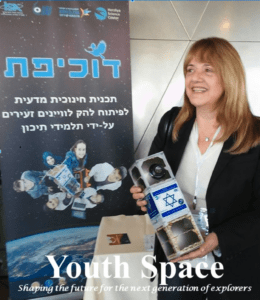
Dr Ana Heller is the founder of the first space youth laboratory of Israel in Herzliya city, and the scientist director of the first generation of Israel student Nano satellites Duchifat-1, Duchifat-2, followed later by Duchifat-3. In 2020, Heller initiated “Youth Space”, a jointly Israel-Spain STEM Nano-satellite program under the support of the foreign ministry of Israel. As the scientist director of the program, Heller is leading the “EspYSat” Nano-satellite project in the community of Madrid, and currently expanding their horizons to new projects in Barcelona schools. In the international field, Heller frequently appears in TV and radio interviews, gives online lectures for faraway poor schools in South America, acts as a member of the Advisory Committee for Adriatic Space Agency, and is the Israel scientists’ residents’ coordinator to the Argentine Embassy in Israel. Heller holds a PhD. in Astrophysics from the School of Physics and Astronomy, and an MSc. in Geophysics and Planetary Sciences from the Department of Geophysics and Planetary Sciences, both degrees from Tel Aviv University (TAU) in Israel.


